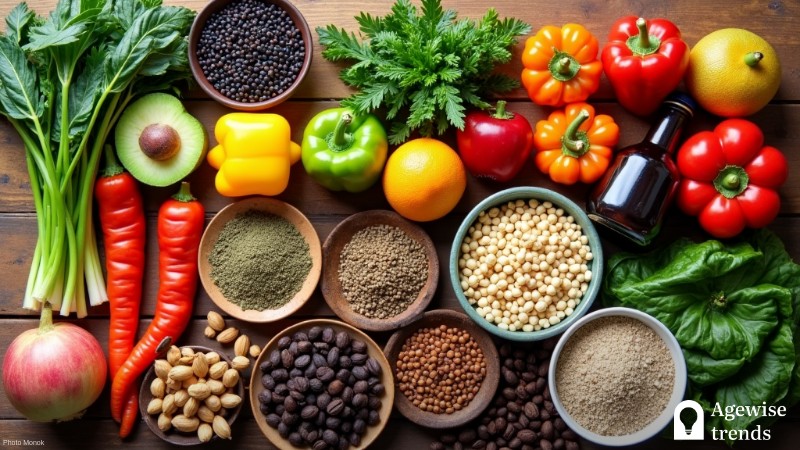Our nutritional requirements alter with age; therefore, eating a balanced diet is more crucial than ever. Maintaining energy, controlling chronic illnesses, and promoting general wellness all depend on eating healthily. However, a number of factors, including growing grocery prices, limited mobility, and ignorance of nutrient-dense meal options, prevent many seniors from eating healthily. Senior well-being can be greatly enhanced by having access to simple, healthful meals, as National Nutrition Awareness Month serves as a timely reminder.
For older adults, the right diet isn’t just about avoiding illness—it’s about thriving. Incorporating nutritious recipes for seniors into daily meals ensures that they receive essential vitamins, minerals, and proteins to sustain energy and promote longevity. By focusing on heart-healthy recipes and balanced nutrition to promote energy, seniors can enjoy meals that taste great while providing lasting health benefits. From convenient meal plans to engaging cooking classes, a holistic approach to senior nutrition makes all the difference.
Key Takeaways
National Nutrition Month highlights the importance of healthy eating for older Americans, emphasizing balanced diets that help maintain energy levels, manage chronic conditions, and promote overall wellness.
- Older Americans face challenges such as steep grocery prices and limited mobility that can hinder healthy eating; however, access to simple, nutritious meals can significantly enhance their quality of life.
- Cooking classes and meal services offer older Americans easy-to-follow recipes and practical, hands-on experience to boost their culinary confidence and support a healthy diet.
- Heart-healthy recipes and well-rounded nutrition are essential for older Americans, focusing on whole grains, lean proteins, and fresh vegetables to promote cardiovascular health and overall well-being.
Easy and healthy recipes for seniors
A lack of cooking skills, restricted kitchen access, or physical restrictions cause many seniors to struggle with meal preparation. For this reason, it’s essential to have easy-to-make recipes for seniors. Meals that require minimal preparation while maximizing nutritional benefits help seniors stay consistent with healthy eating habits.
Senior-focused cooking lessons, such as those provided by several senior wellness facilities or nonprofit organizations for the elderly like the Gary and Mary West PACE in North County San Diego, teach participants how to prepare healthy yet basic meals.
There was also the Budget Bites cooking class that focused on affordable, nutritious meals, teaching participants how to get the most bang for their buck. This class called Budget Bites is held in different locations and now has a finalized schedule for this month of National Nutrition Awareness.
they usually have a focus on health, and now that I’m getting older it makes sense to make healthy foods, but I want them to taste good and I know in these classes they always have good recipes that actually taste good.
Cyndi Allison, Budget Bites attendee
In addition to boosting seniors’ culinary confidence, these practical experiences teach them how to make meals with inexpensive, whole-food materials. By focusing on straightforward recipes such as overnight oats, lentil soup, and black bean quesadillas, seniors can enjoy healthy recipes for overall senior wellness without the hassle of complicated cooking techniques.
Seniors who might find cooking and shopping difficult can also greatly benefit from home-delivered meal services. Accessibility concerns never force elders to sacrifice their health with wholesome, ready-to-eat options. A healthy diet can be easily and joyfully maintained with the correct tools.
Prioritizing health-conscious ingredients for seniors
One of the key aspects of senior nutrition is choosing health-conscious ingredients that provide maximum health benefits. Whole grains, lean proteins, fresh vegetables, and heart-healthy fats are essential components of a nutritious senior diet. Avoiding processed foods high in sodium, added sugars, and unhealthy fats is equally important for maintaining optimal wellness.
Many nutrition programs emphasize the importance of fiber-rich foods, such as oats, beans, and vegetables, which aid digestion and help regulate blood sugar levels. Antioxidant-packed fruits and vegetables also play a vital role in reducing inflammation and protecting against chronic diseases. Health-conscious ingredients for seniors, like nuts, seeds, and omega-3-rich fish, contribute to cognitive function and cardiovascular health.
bring awareness to the topic of nutrition, healthy eating and how that plays into our overall wellbeing.
Dylan Mott, Public Health Education Manager
For seniors with dietary restrictions, creative substitutions can make meals both nutritious and enjoyable. For instance, healthier versions of well-known foods can be made by substituting whole wheat tortillas for white flour, Greek yogurt for sour cream, and honey for refined sugar. Seniors can have a varied, nutrient-rich diet that promotes their long-term health by making minor but significant modifications.
Heart-healthy recipes for seniors
Senior meal planning should prioritize heart-healthy recipes because cardiovascular health is a key concern for older folks. A diet high in lean proteins, fiber, and good fats can help control blood pressure, lower the risk of heart disease, and regulate cholesterol levels. To support cardiac function, seniors should concentrate on eating more plant-based foods, lean meats, and low-fat dairy products.
Avocado toast on whole grain bread, spinach and lentil soup, and grilled salmon with quinoa and roasted vegetables are all easy yet efficient dinner ideas. Nuts and seeds offer heart-healthy unsaturated fats, and incorporating foods high in potassium, such as sweet potatoes and bananas, helps maintain normal blood pressure levels.
For seniors looking for variety, meal programs often introduce culturally inspired dishes with a nutritious twist. Traditional recipes, such as stews, stir-fries, and casseroles, can be modified with healthier ingredients to maintain their authentic flavors while supporting cardiovascular wellness.
Using olive oil instead of butter, lean protein sources instead of fatty cuts of meat, and whole grains instead of processed grains can all improve the heart health of these meals. Using herbs and spices instead of salt can also help lower sodium intake while increasing flavor. Heart-healthy recipes for seniors should not only be good for the body but also satisfying to the palate.
Balanced nutrition for senior energy and wellness
Energy levels naturally decline with age, but proper nutrition can help seniors stay active and engaged. Balanced nutrition to promote energy involves consuming a well-rounded mix of proteins, complex carbohydrates, and healthy fats to maintain strength and endurance. Protein is particularly vital for preserving muscle mass and preventing frailty, making sources like eggs, poultry, fish, and legumes essential in a senior’s diet.
Another element of senior nutrition that is frequently disregarded is hydration. Maintaining cognitive function and avoiding exhaustion caused by dehydration can be achieved by consuming a lot of water, herbal teas, and nutrient-rich broths. To avoid anemia and increase vigor, seniors can also eat foods high in iron, such as lean red meat, spinach, and lentils.
In addition to physical health, mental and social well-being are greatly influenced by appropriate eating. Whether at community gatherings or senior centers, taking part in group meals promotes social interaction and lowers the danger of isolation, and there have been studies that proved that structured shared meal programs provide opportunities for older individuals to connect within their communities, positively impacting their health and well-being.
Meal planning sessions, nutrition courses, and cooking demonstrations provide seniors the skills and self-assurance they need to choose healthier foods every day. These programs not only encourage healthier eating habits but also provide opportunities for seniors to bond with their peers, share experiences, and create meaningful connections. Access to these resources helps older adults maintain a sense of autonomy and dignity in their dietary choices.
By focusing on meals for overall senior wellness, older adults can continue leading fulfilling, independent lives with strength, vitality, and confidence.
Conclusion
To preserve their quality of life, it is crucial to make sure elders have access to nutritious meals for senior wellness. Flavorful, nourishing meals can be enjoyed by older individuals without financial or physical constraints thanks to education, meal assistance programs, and the promotion of senior-friendly foods.
In addition to improving their nutritional status, sharing meals with others improves seniors’ mental health and lessens feelings of loneliness. Seniors can maintain their interest and form lasting relationships by supporting programs that provide cooking classes, communal kitchens, and group eating experiences.
Seniors who incorporate heart-healthy and simple-to-make dishes into their daily routines can take proactive measures to manage chronic diseases, save energy, and improve their general well-being. An extended lifetime is not the only benefit of a proper diet; it also gives seniors the energy and stamina to fully appreciate each day.















